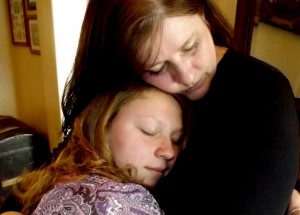 Mothers’ Day has always been a tough one at our house. My wife, Amy, came from a home where she was abused by her father and her mother did nothing to stop it, as long as he provided the meal-ticket.
Mothers’ Day has always been a tough one at our house. My wife, Amy, came from a home where she was abused by her father and her mother did nothing to stop it, as long as he provided the meal-ticket.
At fifteen, Amy went into foster care where she was used to raise younger foster children while the parents partied. My daughters suffered unimaginable abuse at the hand of their birth-mother in Russia. My youngest son, Denney, also from that country, was betrayed by his birth parents, too.
Sarah was five when she joined our family. She was plenty old enough to know what was going on and to play a part in life-altering decisions. She’s now fourteen. Recently Sarah came to me and said: “I miss Mama Oksana.” (That’s the name we have always used for the birth-mother of our daughters). “I used to hate her. Is that okay?” Tears filled my eyes as I wrapped my arms around her and told her it was not only okay, but good. Then I told her I loved her and that I was sorry it was so hard.
That’s the story from the glass half-empty side. We do have experiences with mothers and mothering that we love. Amy had an aunt that stood by her even after she went into foster care. Celeste was almost three when we removed her from an orphanage in Russia. She cried and cried as we took her away from the orphanage director who had mothered her for more than a year and who our daughter had called “Mama Olga” since they first met.
In fact, Celeste, even now, after nine years, still calls Olga “Mama Olga.” Our adopted children got a second chance at a family with a mother who loves them, cares for them, and who keeps them in a safe environment. We have lots of favorite memories about mothers and mother figures.
Mothers’ Day is a paradox for us. It is a time when those in our family who have been abused or neglected by mothers struggle with realizing that there are things about those mothers that they love and miss, while still having at least some negative emotions towards those people.
There came a point in my Amy’s life when she decided that she would forgive her birth-parents for everything they had ever done to her, whether she could remember those things or not. She said that she couldn’t carry the baggage any more. Later, she told me it was the hardest, but most liberating thing she had ever done in her life. Amy tries to teach that principle to our adopted children, but they’re not there, yet. I’m afraid that coming from similar circumstances, I would never get there.
Even though we struggle during Mothers’ Day, we love to thank and remember those who “mothered” us whether they were technically our mothers or not. The compassion that so many women have shown to us in our lives has helped us in immeasurable ways. We’ve never used the term “real mother” at our house. It never made sense to us.
So many have mothered members of our family in so many different ways, that the term “real mother” leaves us confused. And while we may not know what “real mother” means, we definitely know what real mothering is, and there is nothing better than that in the whole world. To all of the women who have mothered the members of our family throughout the years, thank you.
And to my own mother, who was and is an incredible mother, Thank you. I love you.
Follow John M. Simmons on his blog.
